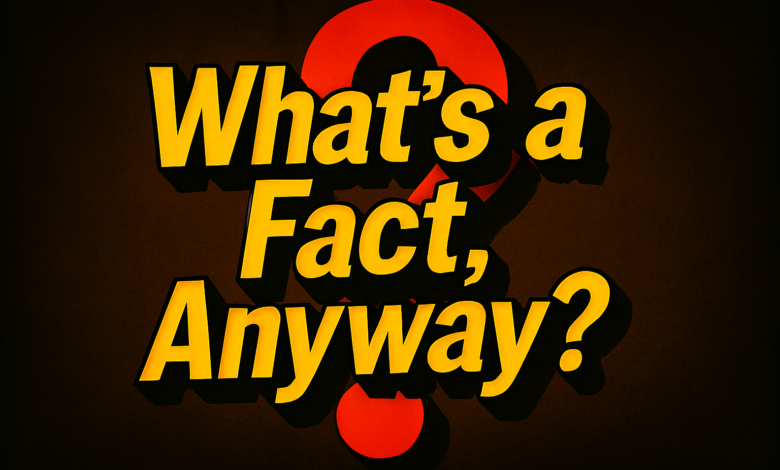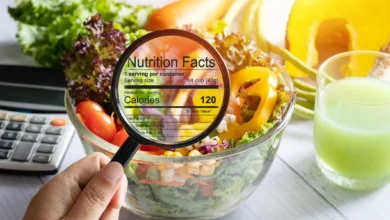“What’s a Fact, Anyway?

Comparing Truth, Opinion & Belief in a Post-Truth Era
In a world where everyone has a platform and every scroll shows a new “truth,” one question keeps echoing louder than ever: “What’s a fact, anyway?”
From WhatsApp forwards to TikTok “science,” we’re constantly exposed to information masquerading as truth. But what separates a cold hard fact from a popular opinion or a deeply held belief?
In this blog, we’ll break it down in a comparison-based format, reviewing how facts differ from opinions, beliefs, and trends — and why this distinction matters more than ever in 2025.
📌 What is a Fact?
✅ Definition: Verifiable Reality
A fact is a statement that can be proven true or false using evidence. It’s not up for debate, and it doesn’t change based on who’s talking.
🔍 Examples:
- Water boils at 100°C at sea level.
- Earth orbits the sun.
- Smoking increases the risk of lung cancer.
Facts are objective. They remain true regardless of belief, emotion, or trend. And yes, they’re still real in an era of “alternative facts.”
💬 What About Opinions?
🆚 Comparison: Subjective Truth
An opinion is a personal judgment or feeling. It’s subjective and can’t be proven right or wrong — because it’s not meant to be.
💡 Examples:
- “Chocolate ice cream is the best.”
- “This movie is overrated.”
- “I think electric cars are ugly.”
Opinions matter — they shape culture, voting, and behavior — but they’re not facts. Confusing the two is where most online drama starts.
🔮 Beliefs: The Emotional Core
🧭 Deep, But Not Always Factual
Beliefs are convictions held to be true, often shaped by culture, religion, personal experiences, or upbringing. Unlike facts, beliefs don’t require proof — and often resist it.
🔍 Example:
- “God exists.”
- “Hard work always pays off.”
- “Fate decides everything.”
Beliefs can be empowering, comforting, and influential — but they’re not universal facts. This doesn’t make them less important — just different.
📲 Trend vs Truth: Why Viral ≠ Valid
In today’s attention economy, what’s trending often gets treated like it’s true. But virality doesn’t equal validity.
🚨 Trending ≠ Fact:
Just because millions viewed a reel or liked a post doesn’t mean the info is accurate. In 2025, with AI-generated content and deepfakes everywhere, verifying facts is more important than ever.
🔁 Think before you repost.
🧾 Check before you believe.
🧠 Feel, but also fact-check.
🧪 Science: The Evolving Side of Facts
Science deals in evidence-based facts, but it also evolves. That doesn’t make it unreliable — it makes it self-correcting.
🎯 Example:
At one time, people believed ulcers were caused by stress. Now we know a bacterium (H. pylori) is responsible. That’s not a failure — it’s progress.
Science updates itself. Conspiracy theories don’t.
⚖️ Why It Matters: The Cost of Confusion
When people blur the lines between fact, opinion, and belief, we lose common ground. Misinformation spreads, polarization increases, and decision-making suffers — from public health to politics.
Think about:
- Vaccine misinformation
- Climate change denial
- Fake news during elections
These aren’t just “opinions.” They’re misinformation dressed as personal truth — and they can be deadly.
🔍 So, How Do You Spot a Fact?
Here’s a quick fact-check checklist:
- Can it be verified with evidence?
- Is it consistent across multiple credible sources?
- Can it be proven true or false using logic or science?
- Does it come from a reputable source?
If the answer is yes — it’s likely a fact. If not, it might just be an opinion, belief, or, worse — propaganda.
🧠 Final Take: Facts Don’t Care About Feelings But You Should Care About Facts
We live in a world full of information overload and emotional noise. That makes it tempting to rely on what feels true instead of what is true. But if we all bend facts to fit our feelings, we lose the ability to solve real problems together.
In 2025, truth is not just about accuracy. It’s about responsibility.
Facts aren’t personal attacks. They’re the foundation for meaningful conversation, smart choices, and real progress.
📌 TL;DR:
- ✅ Facts = Verifiable truths
- 💬 Opinions = Personal views
- 🔮 Beliefs = Deep-rooted convictions
- 📲 Trends = Popular, but not always real
If you’re sharing or creating content today, ask yourself:
“Is this a fact, or just what I feel?”
Because knowing the difference is the smartest thing you can do online — and offline.
Let me know if you’d like this blog turned into:
- A LinkedIn carousel
- A YouTube script
- Or an Instagram infographic post
I’ve got you covered.




